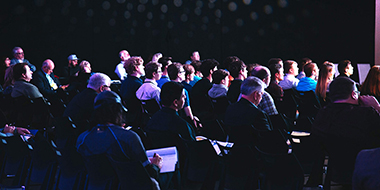



#geokarlsruhe21
Plenaries & Evening Lecture
Monday, 20 September 2021
―
15:15-16:00 h
―
From Poverty to Prosperity: The Real Energy Transition
 Scott W. Tinker
Scott W. Tinker
Scott Tinker works to bring industry, government, academia, and nongovernmental organizations together to address major societal challenges in energy, the environment, and the economy. Dr. Tinker is Director of the 250-person Bureau of Economic Geology, the State Geologist of Texas, and a professor holding the Edwin Allday Endowed Chair in the Jackson School of Geosciences at The University of Texas at Austin.
Tuesday, 21 September 2021
―
15:15-16:00 h
―
Critical Raw Materials for the Energy Transition
 Kathryn Goodenough
Kathryn Goodenough
Dr. Kathryn Goodenough is a Principal Geologist at the British Geological Survey. Her research focuses on the geology and resources of critical raw materials, with a particular interest in the rare earth elements and lithium. She has been involved in a number of large international research projects on this topic, and is currently Principal Investigator for the LiFT (Lithium for Future Technology) project. She is also the Chief Editor of the Open Access journal Earth Science, Systems and Society (ES3) and would welcome submissions from GeoKarlsruhe participants!
Wednesday, 22 September 2021
―
15:15-16:00 h
―
The Future of
Geodata Management – the UK experiences
 Karen Hanghøj
Karen Hanghøj
Dr. Karen Hanghøj has been the Director of the British Geological Survey since October 2019. Karen has extensive experience in business and research, including mineral exploration and leadership roles at the Geological Survey of Denmark & Greenland and EIT RawMaterials. She is a member of a range of advisory boards and has international experience in science and innovation in geoscience including the future of resources, sustainability and circular economy.
Thursday, 23 September 2021
―
15:15-16:00 h
―
Relative Importance of Climate and Humans on Water Storage Changes using GRACE Satellite Data
 Bridget R. Scanlon
Bridget R. Scanlon
Dr. Bridget R. Scanlon is among the leading hydrogeologists and conducts research at the Bureau of Economic Geology at the University of Texas at Austin. Her early research concentrated on groundwater recharge, using monitoring, chemical and isotopic tracers, and numerical modelling. She has examined the impacts of climate change and land use change on groundwater, sources and mitigation of natural and anthropogenic contamination, and managed aquifer recharge. Recent research with very high scientific impact includes the interdependence of water and energy and the reliability of global models using GRACE satellite data. Bridget Scanlon has published about 150 papers in refereed journals. She was a Birdsall-Dreiss Distinguished Lecturer and received the M. King Hubbert Award from NGWA and the President’s Award from the International Association of Hydrogeologists. She is a member of the U.S. National Academy of Engineering.
Public Evening Lecture
Monday, 20 September 2021
―
19:00-20:00 h
―
Geology on Mars (click for details)NASA's Mars Science Laboratory mission, with its Curiosity rover, has been exploring Gale crater since 2012 with the goal of assessing its potential to support life. The mission has compiled compelling evidence that the crater basin accumulated sediment transported by marginal rivers into lakes that likely persisted for millions of years in the early Hesperian. Fluids simultaneously circulated in the subsurface and likely existed through the dry phases of lake bed exposure and eolian deposition creating a continuously habitable deep biosphere environment that persisted of millions to even hundreds of millions of years, conceivably even into early Amazonian time. Geochemical and mineralogical assessments indicate that ancient environmental conditions would have been suitable for sustaining life, if it ever were present. A diversity of organic molecules has been preserved, though degraded, with evidence for more complex precursors. In situ studies of modern wind-driven sediment transport and multiple large and active aeolian deposits have led to advances in physical theory of boundary conditions and bedform development. Despite 9 years of exploration, rover systems and science instruments remain healthy and capable of performing all key scientific objectives.
 John P. Grotzinger
John P. Grotzinger
Dr. John P. Grotzinger is the Harold Brown Professor of Geology, Division of Geological and Planetary Sciences, California Institute of Technology. He was named chair of the Division of Geological and Planetary Scienes in June 2015. He served as chief scientist for NASA's Mars Rover Curiosity mission and is currently a science Co-Investigator on the Perseverence Rover mission. Dr. Grotzinger's research involves the comparative evolution of Earth and Mars in characterizing the origin and early evolution of life on Earth, and the search for biosignatures on Mars. He is a member of the US National Academy of Science, the American Academy of Arts and Sciences, a recipient of NASA's Outstanding Public Service Medal, and the Halbouty Award of the American Assocation of Petroleum Geologists. Dr. Grotzinger is a graduate of Hobart College (BS), the University of Montana (MS) and Virginia Polytechnic Institute (PhD). He served as a professor at MIT for 18 years, moving to Caltech in 2005.
Awards
The DGGV would like to offer a best presentation award and a best poster award for young geoscientists
(students and PhD students).
Best PRESENTATION AWARD: Three best oral presentations of (PhD) students will be selected by a jury and awarded.
The selected oral presentations will be awarded during the Closing Session on Thursday, 23/Sept/2021: 5:45 pm - 6:00 pm.
If you would like to apply for this:
- You need to upload your PPT in ConfTool here by 30 August so that the jury can get information and plan in time. This PPT is only for the jury and would not be published!
- You have to be present at the virtual closing ceremony on Thursday, September 23| 5:45 pm – 6:00 pm.
Best POSTER AWARD: Three best posters of (PhD) students will be selected by a jury and awarded. The selected posters will be awarded during the Closing Session on Thursday, September 23| 5:45 pm – 6:00 pm.
You have to be present at the virtual closing ceremony on Thursday, September 23| 5:45 pm – 6:00 pm.
GEOKARLSRUHE 2021
virtual conference + on-site excursions
Sustainable Earth –
from processes to resources
19–24 September 2021 | Karlsruhe
DGGV Annual Meeting
CONTACT CONFERENCE SECRETARY
F&U confirm
Permoserstraße 15
04318 Leipzig
Germany









